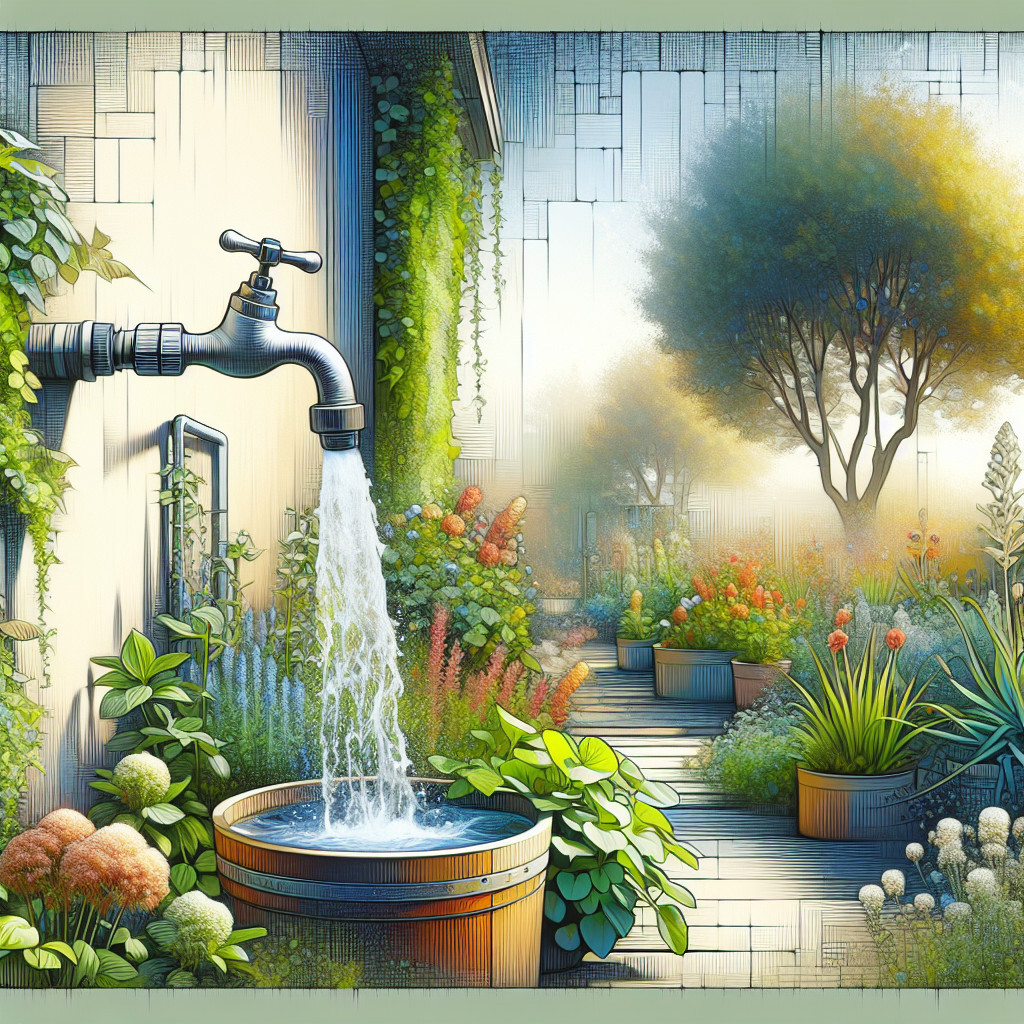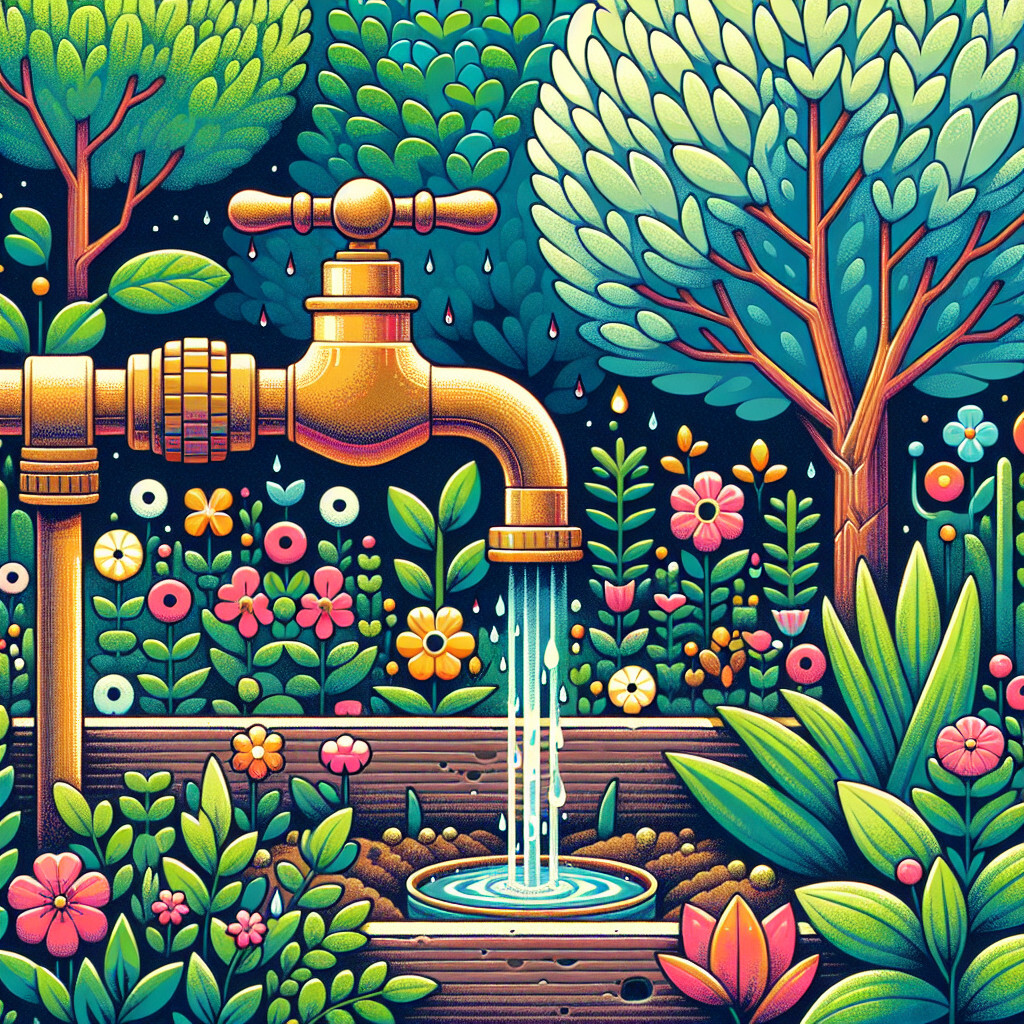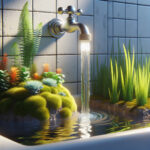-
Table of Contents
“Tap Water: The Lifeblood of Your Garden’s Growth.”
Introduction

Tap water and gardening are interconnected in many ways. Tap water, which is treated and made safe for human consumption, is often used as a primary source of irrigation for home gardens. Gardening, a practice of growing and cultivating plants, relies heavily on the availability and quality of water. The use of tap water in gardening can have various effects on plant growth and health, depending on the water’s chemical composition. Therefore, understanding the relationship between tap water and gardening is crucial for successful plant cultivation.
Understanding the Role of Tap Water in Plant Growth
Tap water, a readily available resource in most households, plays a significant role in gardening. It is the primary source of hydration for plants, and its quality can significantly impact plant growth and development. Understanding the role of tap water in plant growth is crucial for any gardener, whether a novice or a seasoned expert.
Water is a fundamental requirement for all living organisms, including plants. It is involved in various physiological processes such as photosynthesis, nutrient transport, and temperature regulation. In photosynthesis, plants use water, along with sunlight and carbon dioxide, to produce glucose, which provides them with the energy they need to grow. Water also acts as a carrier, transporting essential nutrients from the soil to different parts of the plant. Moreover, through a process called transpiration, plants release water into the atmosphere, helping to cool themselves and maintain their internal temperature.
Tap water, being the most accessible form of water for many gardeners, is commonly used for watering plants. However, the quality of tap water can vary greatly depending on the source and treatment process. It may contain various minerals, salts, and chemicals that can affect plant growth either positively or negatively.
One of the primary concerns with using tap water for gardening is its potential hardness. Hard water contains high levels of calcium and magnesium, which can build up in the soil over time and affect its structure and pH. While these minerals are essential for plant growth, excessive amounts can lead to nutrient imbalances and inhibit the absorption of other vital nutrients such as iron and zinc.
Another concern is the presence of chlorine, a chemical commonly used in water treatment to kill bacteria and other harmful microorganisms. While chlorine is effective in ensuring the safety of drinking water, it can be harmful to plants, especially when present in high concentrations. It can cause leaf tip burn, reduced growth, and in severe cases, it can even lead to plant death.
However, it’s important to note that not all tap water is detrimental to plants. In many cases, it can provide beneficial minerals that plants need for growth. For instance, tap water often contains trace amounts of iron, copper, and zinc, which are essential for various plant functions such as chlorophyll production and enzyme activation.
To ensure that tap water is safe for plants, gardeners can take several steps. First, they can have their tap water tested to determine its hardness and chemical content. If the water is hard or contains high levels of chlorine, they can consider using a water softener or letting the water sit out for a few hours before use to allow the chlorine to evaporate. Alternatively, they can use rainwater or distilled water, which are typically softer and free of chemicals.
In conclusion, while tap water is a convenient source of water for gardening, its quality can significantly impact plant growth. By understanding the role of tap water in plant growth and taking steps to ensure its suitability, gardeners can promote healthier and more productive plants.
The Impact of Chlorine in Tap Water on Your Garden
Tap water is a readily available resource that many gardeners use to hydrate their plants. However, it’s important to note that tap water often contains chlorine, a chemical used by water treatment facilities to kill bacteria and other harmful organisms. While chlorine is beneficial for ensuring our drinking water is safe, it can have a significant impact on your garden.
Chlorine is a potent chemical that can be harmful to plants in large amounts. It can interfere with plant growth, hinder the absorption of essential nutrients, and even cause leaf burn in extreme cases. This is because chlorine disrupts the delicate balance of microorganisms in the soil. These microorganisms play a crucial role in breaking down organic matter and making nutrients available to plants. When chlorine kills these beneficial bacteria, it can lead to nutrient deficiencies and poor plant health.
Moreover, chlorine can also affect the pH level of your soil. Most plants prefer slightly acidic to neutral pH levels. However, chlorine tends to make the soil more alkaline, which can prevent plants from absorbing the nutrients they need to thrive. This is particularly problematic for acid-loving plants like azaleas, rhododendrons, and blueberries, which can struggle in alkaline conditions.
However, it’s not all doom and gloom. There are ways to mitigate the impact of chlorine on your garden. One simple method is to let your tap water sit out in an open container for 24 hours before using it. This allows the chlorine to evaporate naturally. Alternatively, you can use a dechlorinator, a product available at most garden centers, which neutralizes chlorine instantly.
Another option is to use rainwater, which is naturally free of chlorine. Collecting rainwater in barrels is an environmentally friendly way to provide your plants with the water they need. It’s worth noting, however, that rainwater can be acidic, so it’s important to monitor your soil’s pH levels regularly if you choose this option.
In addition, you can also add organic matter to your soil to help buffer against changes in pH and to provide a habitat for beneficial microorganisms. Compost, well-rotted manure, and leaf mold are all excellent choices. These materials not only improve the structure and fertility of your soil but also help to protect your plants from the harmful effects of chlorine.
In conclusion, while chlorine in tap water can pose challenges for gardeners, it’s not an insurmountable problem. By taking steps to dechlorinate your water, monitor your soil’s pH levels, and enrich your soil with organic matter, you can create a thriving garden despite the presence of chlorine. Remember, the key to successful gardening is understanding and working with the natural processes in your garden, rather than against them. With a little knowledge and effort, you can ensure that your plants have the best possible environment in which to grow and flourish.
How to Properly Use Tap Water in Your Home Garden
Tap water is a readily available resource that many home gardeners utilize for their plants. However, it’s essential to understand how to use it properly to ensure the health and vitality of your garden. This article will delve into the intricacies of using tap water in your home garden, providing you with the knowledge to cultivate a thriving green space.
Firstly, it’s crucial to understand that tap water varies in quality depending on your location. In some areas, tap water may contain high levels of minerals such as calcium and magnesium, commonly referred to as hard water. While these minerals are not harmful to humans, they can accumulate in the soil over time and affect the pH level, making it more alkaline. This can hinder the absorption of essential nutrients by plants, leading to stunted growth or even plant death. Therefore, if you live in an area with hard water, it may be beneficial to occasionally use rainwater or distilled water to irrigate your plants.
Secondly, tap water often contains chlorine, a chemical used to kill harmful bacteria. While chlorine is safe for human consumption, it can be detrimental to plants, particularly those in a closed system like a hydroponic garden. Chlorine can damage plant tissues and inhibit growth. However, there’s a simple solution to this problem. By leaving tap water to stand uncovered for 24 hours, the chlorine will evaporate, making the water safe for your plants.
Another factor to consider is the temperature of the tap water. Cold water can shock the plants, causing damage to their roots and leaves. It’s advisable to use water that is at room temperature, as this is less likely to cause any harm to your plants.
It’s also worth noting that some plants have specific water requirements. For instance, certain plants thrive in acidic soil and may not do well with alkaline tap water. In such cases, it may be necessary to adjust the pH of the water using a pH adjuster, which is readily available in gardening stores.
Moreover, overwatering is a common mistake many home gardeners make. Regardless of the water source, plants need a balance of water and air in the soil to grow properly. Overwatering can lead to waterlogged soil and root rot, which can kill the plant. It’s important to understand the watering needs of each plant in your garden and adjust accordingly.
Lastly, while tap water is a convenient source of water for your garden, it’s important to consider its environmental impact. Water treatment and distribution consume a significant amount of energy and contribute to carbon emissions. Therefore, using alternative sources of water, such as rainwater or greywater, can help reduce your environmental footprint.
In conclusion, while tap water can be used effectively in home gardening, it’s important to consider factors such as water hardness, chlorine content, temperature, and the specific needs of your plants. By understanding these factors and adjusting your watering practices accordingly, you can ensure that your garden thrives. Remember, the key to successful gardening lies in balance and understanding the unique needs of your plants.
The Pros and Cons of Using Tap Water for Gardening
Gardening is a rewarding hobby that requires careful attention to detail, particularly when it comes to watering. The source of water used can significantly impact the health and growth of plants. Many gardeners use tap water for its convenience, but it’s essential to understand the pros and cons of this practice.
One of the primary advantages of using tap water for gardening is its accessibility. It is readily available in most households, making it a convenient option for gardeners. This eliminates the need for collecting rainwater or purchasing distilled water, both of which can be time-consuming and costly. Moreover, tap water is typically treated and regulated by local municipalities to ensure it is safe for consumption, which also means it’s generally safe for plants.
Another benefit of tap water is that it often contains beneficial minerals like calcium, magnesium, and potassium. These minerals are essential for plant growth and can contribute to the overall health and vitality of your garden. In addition, tap water is usually pH balanced, which is crucial for the absorption of these nutrients by the plants.
However, despite these advantages, there are also several drawbacks to using tap water for gardening. One of the main concerns is the presence of chlorine. While chlorine is added to tap water to kill harmful bacteria and other microorganisms, it can also be detrimental to plants. Chlorine can inhibit plant growth and, in high concentrations, can even cause damage to plant tissues.
In addition to chlorine, tap water may also contain other potentially harmful substances such as fluoride and heavy metals. Fluoride, which is added to many municipal water supplies to promote dental health, can be toxic to certain plants, particularly those in the lily family. Heavy metals, on the other hand, can accumulate in the soil over time and may harm beneficial soil microorganisms, affecting soil health and fertility.
Furthermore, the hardness or softness of tap water can also impact its suitability for gardening. Hard water contains high levels of calcium and magnesium, which can lead to the buildup of mineral deposits in the soil. This can affect the soil’s structure and its ability to retain water and nutrients. Conversely, soft water, which has been treated to remove these minerals, can be too low in essential nutrients for optimal plant growth.
In conclusion, while tap water offers convenience and can provide necessary nutrients for plants, it also comes with potential downsides. The presence of chlorine, fluoride, heavy metals, and the hardness or softness of the water can all impact plant health and soil quality. Therefore, gardeners should consider these factors when deciding whether to use tap water for their plants. It may be beneficial to test the tap water and soil regularly to ensure they are suitable for gardening. Alternatively, gardeners can consider other water sources or treatment methods to mitigate the potential drawbacks of using tap water.
Q&A
1. Question: Is tap water safe for gardening?
Answer: Yes, tap water is generally safe for gardening. However, it can sometimes contain chlorine, which can be harmful to some plants in large amounts.
2. Question: Can tap water affect the pH level of the soil?
Answer: Yes, tap water can affect the pH level of the soil. Tap water is often alkaline, which can raise the pH level of the soil over time.
3. Question: Should I let tap water sit before watering plants?
Answer: Yes, it’s a good idea to let tap water sit before watering plants. This allows chlorine and other harmful chemicals to evaporate.
4. Question: Can the use of tap water lead to mineral buildup in the soil?
Answer: Yes, continuous use of tap water can lead to a buildup of minerals like calcium and magnesium in the soil, which can affect plant growth.
Conclusion
In conclusion, tap water can be used effectively for gardening. However, its quality and suitability may vary depending on the local water treatment process and the specific needs of the plants. Some plants may be sensitive to the chlorine or other chemicals often found in tap water. Therefore, it’s important for gardeners to understand their local water quality and the needs of their plants.






